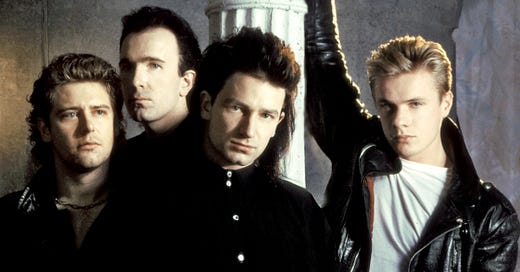It’s become low-hanging fruit to pile on to the perpetual hate of so-called “lame” bands in the internet era. You know what I’m talking about — your Nickelbacks, Creeds, Coldplays, etc. When bombastic rock music becomes oversaturated on the radio and in the greater general popular culture, history has shown that it will consequently become the subject of much scorn and ridicule.
U2 are the forefathers of this somewhat exclusive club of rock bands that are as incredibly successful as they are despised by the archetype of the music snob. While I agree that by the mid-1990s, U2 had become a shell of their former selves and had effectively “sold out” (though, I don’t like that term very much - get your money, girl), the early part of the U2 canon still holds up as some of my favorite post-punk of its time. Yes, it’s not especially challenging to listeners and Bono’s faux-preachiness has been in tact from day one, but early U2 is too catchy and well-executed to be lumped in with the image of the band that has sprouted in the wake of the infamous Songs of Innocence scandal.
I was recently listening to The Unforgettable Fire, an album I had formerly brushed off after taking my father’s word on it as scripture - “It’s overrated.” But I was honestly taken aback by how engaged I was with the listening experience from beginning to end. It’s not overly long, has one of the original overplayed U2 classics in “Pride (In the Name of Love),” and uses its seemingly uneven sequencing as an effective tool in giving the record an almost cinematic quality. It should also be of no surprise that the fingerprints of two figures who have proven central to the advancement of rock music and music in general are all over the record: producers Brian Eno and Daniel Lanois.
The track I was most taken aback by on the album was surprisingly perhaps its most unheralded, “Indian Summer Sky.” The track fades in on an already blistering, oppressive percussive rhythm from Larry Mullen Jr., whose energy is matched by The Edge’s scratchy guitar picking and Adam Clayton’s melodic bass counterpoint. It’s evident that the band is firing on all cylinders on this track from its opening moments. Bono then enters the fold with a contemplative musing on the nature surrounding him.
In the ocean cuts ring deep, the sky
Like there, I don't know why
In the forest there's a clearing
I run there toward the light
Sky, it's a blue sky
While I can’t speak to exactly what Bono is trying to surmise through his words, his repeated mention of his running towards the open sky suggests a spiritual element, perhaps one at the end of a life, the soul of the narrator giving his former vessel for life to the higher powers that reside above the clouds.
Enough of that deep shit. The restlessly bouncing synths that provide a transition from verse to verse are just so tasty and so Eno. I love almost anything that Brian Eno has ever done, so it makes sense that U2’s most ambient, spatial record up to this point in their career has made the deepest impression on me.
The track’s chorus has been stuck in my head for well over a week and will remain there for an indefinite amount of time, thanks to its enchanting repetition and the choir of voices that ring out. Don’t sue me for pointing out Eno’s voice first, there’s real Remain in Light vibes here. The chorus’ words further expand upon the theme of one giving up their body and soul to nature.
So wind go through to my heart
So wind blow through my soul
I’d love to pick Bono’s brain and ask him where this song came from and where his head was at while composing the simple and poignant poetry that accompanies it. It’s a shame that he might not be able to remember, though, as the song quickly fell out of favor within the band, being dropped from live setlists before the end of the album’s promotional tour and never being played in America. In fact, the song is believed to have only been performed live nine times by the band, and it hasn’t been mentioned much since, though it was a favorite of Adam Clayton’s during the initial album cycle.
I leave you with a duty— that being to give early U2, namely Boy to The Joshua Tree, a chance. I know the reputation and I know the things that have been done that have led to that reputation. They are not a perfect band and deserve criticism. But by golly, early U2 bucks the trends that would plague the band later in their career, and “Indian Summer Sky” is a great example of that.
Listen tom “Indian Summer Sky” here.





